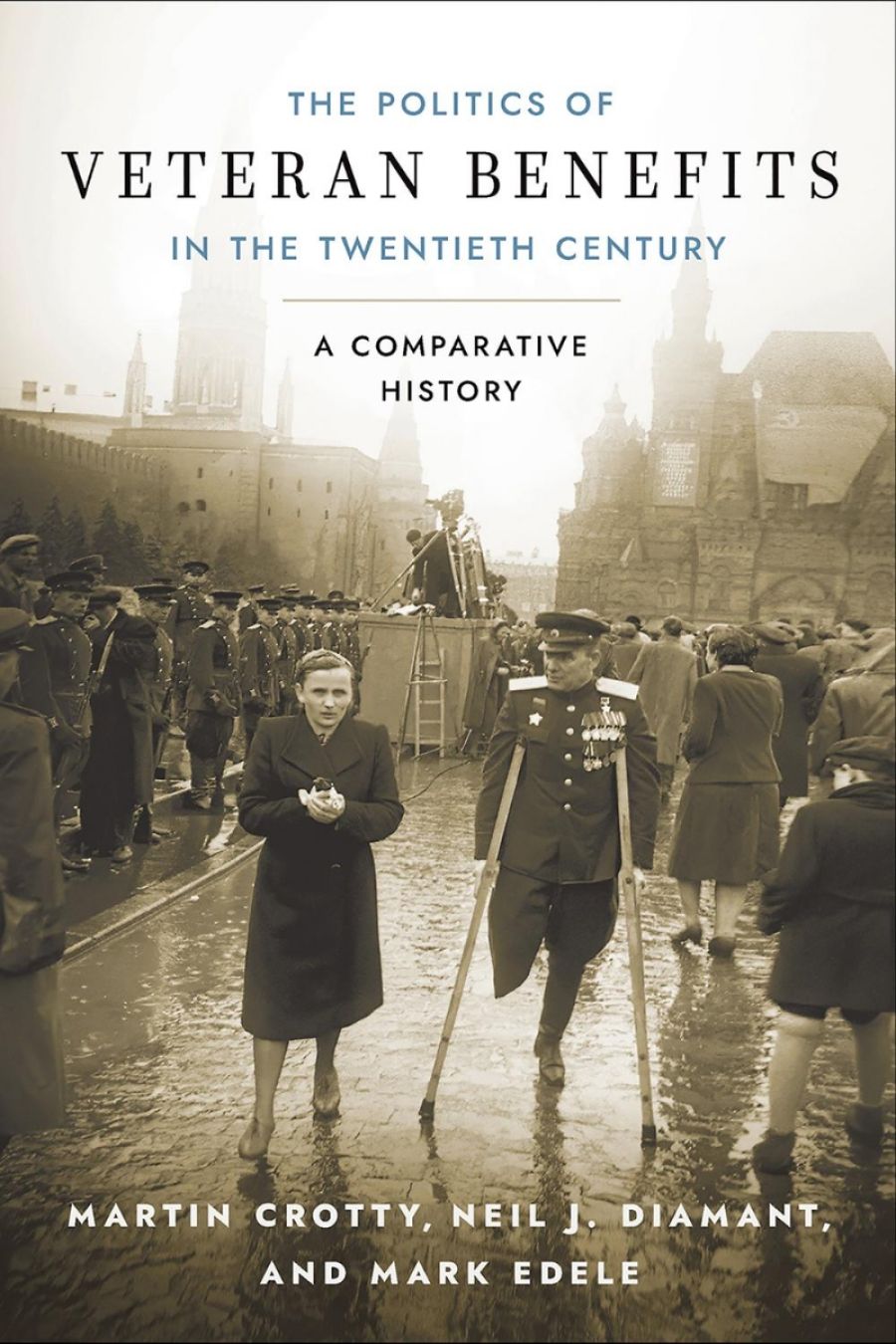
- Free Article: No
- Contents Category: History
- Review Article: Yes
- Article Title: Identifying patterns
- Article Subtitle: The benefits of joint authorship
- Online Only: No
- Custom Highlight Text:
Comparison, when it comes to historical study, is rarely devoid of ambition. The aim is to identify patterns that are global in their significance and to overcome the tendency to see a unique trajectory for particular places or nations. Yet such work frequently founders when it becomes apparent that the author’s knowledge of alternative cases is thin or that the claim to comparison is made to hide a focus that is in fact quite narrow. Not so in this co-authored book, which builds upon its three authors’ areas of expertise – the Anglosphere (Martin Crotty), Asia (Neil J. Diamant), and Europe (Mark Edele) – to deliver a compelling argument about veteran benefits in the twentieth century.
- Grid Image (300px * 250px):

- Book 1 Title: The Politics of Veteran Benefits in the Twentieth Century
- Book 1 Subtitle: A comparative history
- Book 1 Biblio: Cornell University Press, US$35 hb, 231 pp
- Book 1 Readings Link: booktopia.kh4ffx.net/7mexGr
It is easy to underestimate just how much skill it takes to present relatively seamlessly such deep scholarship and analysis. Each author is impressively expert at extracting the essence of his designated domain. Each is generous in acknowledging the work of other scholars and in building on their findings without getting bogged down in what must have been a mountain of detail. The historians’ brief of providing context and the political scientist’s charge to impose schema have been achieved with admirable economy and an impressive capacity to sustain focus.
The book examines why neither victory in war nor a democratic or authoritarian political tradition were accurate predictors of postwar attitudes to veterans. Australia in both world wars, and the United States after World War II, emerge as the nations that provided the most generous welfare and support schemes to their veterans. Communist societies such as the Soviet Union and China were the least likely to preference or reward veterans, although defeated nations such as Japan and the Federal Republic of Germany ultimately created generous veteran benefits and entitlements.
In seeking to explain these divergent outcomes, the authors settle on ‘politics’ and more specifically on the strength of veterans’ organisations, political ideologies, and opportunities as the difference between generosity and parsimony. British veterans provide a case in point. Government preference for private philanthropy over state support militated against extensive veteran entitlements after World War I. Following World War II, a new commitment to building a welfare state for all saw the specificity of veteran claims sidelined. British veteran organisations, relatively small-scale and poorly organised, were dominated by establishment types and rendered unlikely to press claims for the less fortunate. The contrast with Australia’s Returned Services League (RSL) could not be starker.
This is a history of winners and losers. The chapter titles – ‘Victors Victorious’, ‘Victors Defeated’, ‘Benefits for the Vanquished’, ‘The Politically Weak’, ‘The Politically Powerful’ – give the game away. Perhaps the ambition for comparison across so many polities inevitably pushed the authors towards polarity; with so much ground to cover, the need for order precluded nuance. The structure also leads to a reasonable amount of recapping and repetition. Revealing the central explanatory framework of ‘politics’ so early in the piece means that there is not much sense of unfolding drama, and also scant consideration of factors that might have unsettled or challenged the central claim. With no pretension of being literary history, the book more closely resemble a series of engaging conference papers, bold in their thesis, engaging in their examples, but with little time to develop a narrative arc, to put flesh on the bones of the main characters, to consider alternative views, or to indulge the old adage, ‘show, don’t tell’.
Two issues that emerge throughout the book strain against its structure. The first is the assumption, shared by figures as unalike as Roosevelt, Churchill, and Stalin, that veterans should not be deemed a class with a specific claim on the state. Here was a conceptual link that united disparate cases, and working with its contingencies might have provided a way around the stark analytic choice between success and failure. Second, while there is some consideration of the leverage enabled by international veterans’ organisations, their specific dynamics, foci, and impact are less clear. To be fair, the authors themselves flag the latter as a fruitful area of further research, but one wonders how its findings might complicate the story that they have told.
The writing is by turn learned, acerbic, impressively lucid – political science primer and dad joke. I can’t in the end decide if the book is a bit blokey, unselfconsciously transparent, or brave. Has anyone else ever mentioned Tim Tams in a book published by Cornell University Press? Reservations about the style aside, the authors have produced a work that achieves their goal of producing a clear and compelling argument, and they are to be applauded for staring down the challenges of interdisciplinarity and tackling such an enormous topic with confidence.
The authors hope their book will seed the field of ‘comparative veteran studies’. Maybe it will – their conclusion was a model of pointing to new research directions and promoting the work of the next generation of scholars. Just like breaking up, joint authorship is hard to do. This team of scholars in their prime has demonstrated its strengths and has left no one in doubt that when it comes to comparative history, three minds are better than one.


Comments powered by CComment